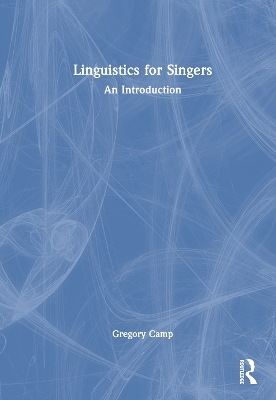
Linguistics for Singers
An Introduction
Seiten
2023
Routledge (Verlag)
978-1-032-34153-8 (ISBN)
Routledge (Verlag)
978-1-032-34153-8 (ISBN)
Linguistics for Singers: An Introduction is a textbook and manual that provides singers with a foundation in linguistic features of four major singing languages: English, Italian, French, and German, and shows how these features can be used to inform vocal performance and interpretation.
Linguistics for Singers: An Introduction is a textbook and manual that provides singers with a foundation in linguistic features of four major singing languages—English, Italian, French, and German—and shows how these features can be used to inform vocal performance and interpretation.
Going beyond the basics of lyric diction, a grounding in linguistics enables student musicians to understand language holistically and more fully comprehend the music they are learning. The comparative approach to four common languages allows readers to readily grasp similarities and apply principles across vocal repertoire. Beginning with the sounds of a language and gradually moving up through larger levels of linguistic structure, from words to full texts, the chapters illustrate concepts using real examples from art songs and opera. The clear explanations enable readers new to linguistics to connect these concepts with their own musical practice.
Designed for flexible use in courses on language and singing, lyric diction, repertoire studies, and collaborative piano, this book provides a vital resource for singers, vocal instructors, and conductors.
Linguistics for Singers: An Introduction is a textbook and manual that provides singers with a foundation in linguistic features of four major singing languages—English, Italian, French, and German—and shows how these features can be used to inform vocal performance and interpretation.
Going beyond the basics of lyric diction, a grounding in linguistics enables student musicians to understand language holistically and more fully comprehend the music they are learning. The comparative approach to four common languages allows readers to readily grasp similarities and apply principles across vocal repertoire. Beginning with the sounds of a language and gradually moving up through larger levels of linguistic structure, from words to full texts, the chapters illustrate concepts using real examples from art songs and opera. The clear explanations enable readers new to linguistics to connect these concepts with their own musical practice.
Designed for flexible use in courses on language and singing, lyric diction, repertoire studies, and collaborative piano, this book provides a vital resource for singers, vocal instructors, and conductors.
Gregory Camp is Senior Lecturer in Music at the University of Auckland, New Zealand.
Acknowledgements
Part One: Language
One Introduction: Why Languages?
Two Translation
Part Two: Phonetics
Three Vowels
Four Consonants
Part Three: Grammar
Five Nouns
Six The Noun Phrase
Seven Verbs
Eight Other Parts of Speech
Nine Syntax
Part Four: Poetics
Ten English and German Versification
Eleven French and Italian Versification
Part Five: Examples
Twelve English Examples
Thirteen Italian Examples
Fourteen German Examples
Fifteen French Examples
Conclusion
References
Index
| Erscheinungsdatum | 24.08.2023 |
|---|---|
| Zusatzinfo | 5 Line drawings, black and white; 5 Illustrations, black and white |
| Verlagsort | London |
| Sprache | englisch |
| Maße | 178 x 254 mm |
| Gewicht | 530 g |
| Themenwelt | Kunst / Musik / Theater ► Musik ► Instrumentenkunde |
| Kunst / Musik / Theater ► Musik ► Klassik / Oper / Musical | |
| Geisteswissenschaften ► Sprach- / Literaturwissenschaft ► Sprachwissenschaft | |
| ISBN-10 | 1-032-34153-X / 103234153X |
| ISBN-13 | 978-1-032-34153-8 / 9781032341538 |
| Zustand | Neuware |
| Informationen gemäß Produktsicherheitsverordnung (GPSR) | |
| Haben Sie eine Frage zum Produkt? |
Mehr entdecken
aus dem Bereich
aus dem Bereich
die Sammlung von Bernhard Kolberg
Buch | Hardcover (2024)
E Reinhold (Verlag)
39,00 €
Roman
Buch | Hardcover (2024)
Wallstein Erfolgstitel - Belletristik und Sachbuch (Verlag)
20,00 €


